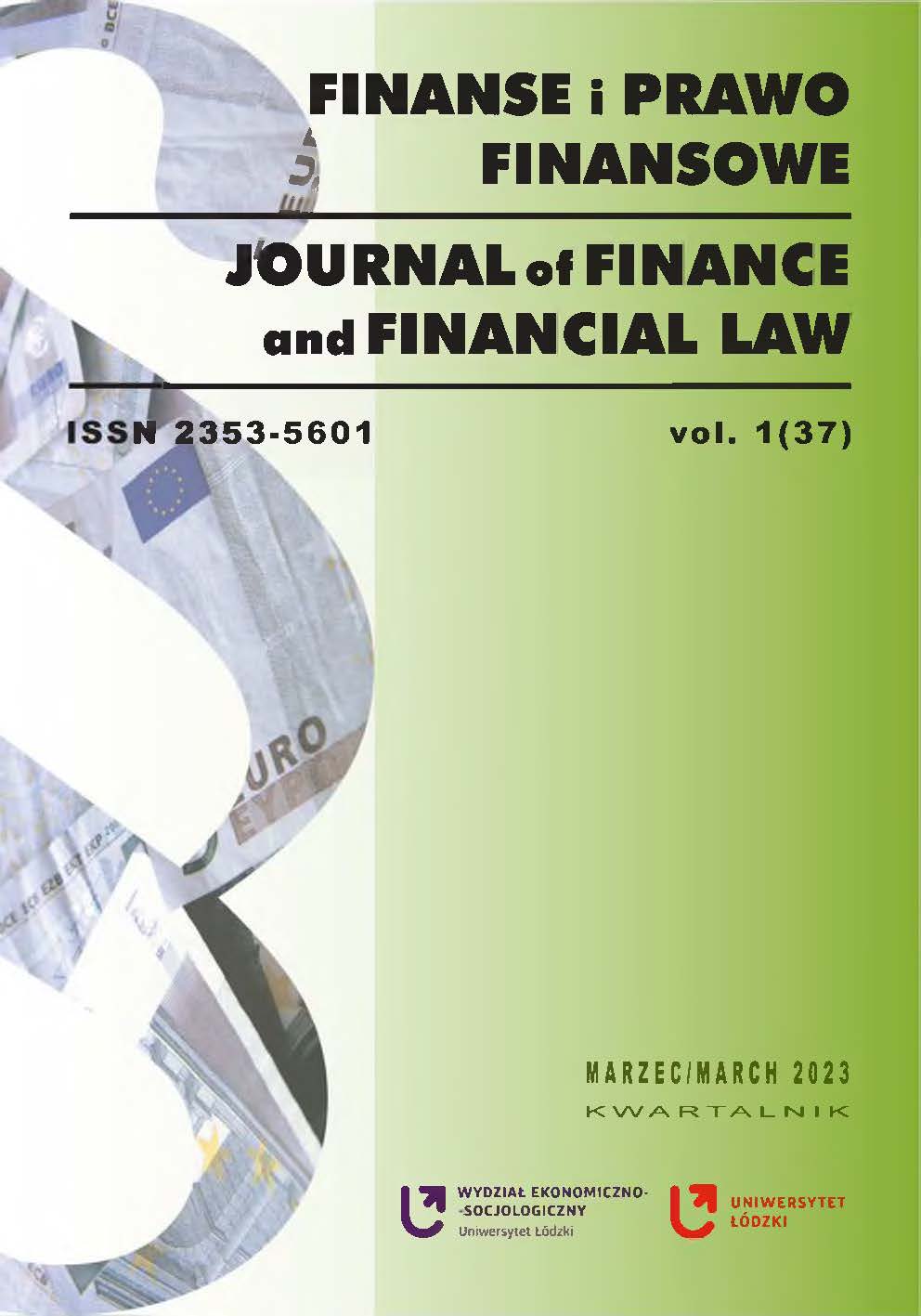Do External Debt and Foreign Direct Investment (FDI) Inflow support Economic Growth? Evidence from Ghana
DOI:
https://doi.org/10.18778/2391-6478.1.37.08Keywords:
External debt, FDI, economic growth, GDP, GhanaAbstract
The purpose of the article/hypothesis: The prime objective of this study is to discover whether external debt and foreign direct investment promote economic development. The paper investigates whether external debt and foreign direct investment inflows stimulate economic growth, intending to determine the causal relationship between the variables to serve as a substantial factor for policymakers.
Methodology: Numerous econometrics techniques were employed to ensure the findings' effectiveness and accuracy, including the stationarity test, Johansen cointegration test, and multiple regression (ordinary least squares). The hypothesis test that external debt and foreign direct investment inflows do not attain their justification of ensuring economic growth was conducted empirically.
Results of the research: The outcome revealed that external debt and foreign direct investment positively and significantly support Ghana's economic growth. This leads to the conclusion that these variables fulfilled their purpose.
Downloads
References
Agyapong D. and Bediabeng K. (2019), External debt stock, foreign direct investment and financial development: Evidence from African economies. Journal of Asian Business and Economic Studies, 27(1), pp. 81–98, https://doi.org/10.1108/JABES-11-2018-0087
Google Scholar
DOI: https://doi.org/10.1108/JABES-11-2018-0087
Alfredo S. (2004), Debt and Economic Growth in Developing and Industrial Countries, Mimeo, 46(0), pp. 1–37.
Google Scholar
Benedict C., Rina B. and Toan Q. N. (2003), External Debt, Public Investment, and Growth in Low-Income Countries, IMF Working Papers, 03(249), pp. 1–25.
Google Scholar
DOI: https://doi.org/10.5089/9781451875904.001
Bese E. and Friday H. (2021), The Effect of External Debt on Life Expectancy Through Foreign Direct Investment: Evidence from Turkey, International Journal of Economics and Financial Issues, 11(2), https://doi.org/10.32479/ijefi.10958
Google Scholar
DOI: https://doi.org/10.32479/ijefi.10958
Ebenezer S. A. and Xicang Z. (2013), Impact of Foreign Direct Investment and Economic Growth in Ghana: A Cointegration Analysis. International Journal of Business and Social Research, 3(1), pp. 64–74.
Google Scholar
Frimpong J., and Oteng-Abayie E. (2007), The Impact of External Debt on Economic Growth in Ghana: A Cointegration Analysis, Journal of Science and Technology (Ghana), 26(3), https://doi.org/10.4314/just.v26i3.33013
Google Scholar
DOI: https://doi.org/10.4314/just.v26i3.33013
Gaies B. and Nabi M. (2021), Banking crises and economic growth in developing countries: Why privileging foreign direct investment over external debt? Bulletin of Economic Research, https://doi.org/10.1111/boer.12271
Google Scholar
DOI: https://doi.org/10.1111/boer.12271
George O.A., James A. and Peter K. (2013), Foreign Direct Investment: A Journey to Economic Growth in Ghana - Empirical Evidence, International Business & Economics Research Journal, 12(5), https://doi.org/10.19030/iber.v12i5.7832
Google Scholar
DOI: https://doi.org/10.19030/iber.v12i5.7832
Hakimi A., Boussaada R., and Karmani M. (2019), External Debt, Investment, and Economic Growth: A Seemingly Unrelated Regression Model for Low-Income Countries. Journal of Economic Integration, 34(4), https://doi.org/10.11130/jei.2019.34.4.725
Google Scholar
DOI: https://doi.org/10.11130/jei.2019.34.4.725
Joshua U., Babatunde D. and Sarkodie S. (2021), Sustaining Economic Growth in Sub-Saharan African: Do FDI inflow and External Debt Count? Journal of Risk and Financial Management, 14(4), https://doi.org/10.3390/jrfm14040146
Google Scholar
DOI: https://doi.org/10.3390/jrfm14040146
Ken O. A. (2020), The Annual Public Debt Report for the 2019 Financial Year, Accra: Ministry of Finance and Economic Planning.
Google Scholar
Kusi G. (20130, Regulatory Framework for Investing in Ghana. Ghana Investment Promotion Centre, Accra: Ghana Investment Promotion Centre.
Google Scholar
Matuka A. and Asafo S. S. (2019), External Debt and Economic Growth in Ghana: A Cointegration and a Vector Error Correction Analysis, Theoretical and Practical Research in Economic Fields,1(19), pp. 45–53, https://doi.org/10.14505/tpref.v10.1(19).05
Google Scholar
DOI: https://doi.org/10.14505/tpref.v10.1(19).05
Michael A., Daniel O. and Jacob A. (2019), Analysis of the determinants of foreign direct investment in Ghana, Journal of Asian Business and Economic Studies, 26(1), pp. 56-75, https://doi.org/10.1108/JABES-08-2018-0057
Google Scholar
DOI: https://doi.org/10.1108/JABES-08-2018-0057
MOFEP, (2011), Medium Term Debt Management Strategy 2012–2014, Accra: Ministry of Finance and Economic Planning.
Google Scholar
Munasinghe M., Attapattu A. and Padmasiri H. (2018), Long Run Association between Public Debt and Economic Growth in Sri Lanka, Modern Economy, pp. 775–789.
Google Scholar
DOI: https://doi.org/10.4236/me.2018.94051
Mustapha I., Joseph Y., Sahabi I., and Baba A. (2015), FDI, Economic Growth and Service Sector Value Additions in Ghana, International Journal of Academic Research in Business and Social, 5(12).
Google Scholar
DOI: https://doi.org/10.6007/IJARBSS/v5-i12/1942
Naeem A. (2013), Empirical Examination of Debt and Growth Nexus in South Asian Countries. Asia-Pacific Development Journal, 20(2), pp. 29–52.
Google Scholar
DOI: https://doi.org/10.18356/0cbbc6e3-en
OECD (2008), FDI Components, Accounts and Scope. In OECD, OECD Benchmark Definition of Foreign Direct Investment, Fourth Edition ed., pp. 59–90.
Google Scholar
Rosemary T. C. (1993), The Effects of Debt Burden on Economic Growth in Heavily Indebted Developing Nations. Journal of Economic Development, 18(1).
Google Scholar
Samuel A., Ebenzer F. E., Gifty, A. M. and Xicang Z. (2013), Impact of Foreign Direct Investment on Economic Growth: Empirical Evidence from Ghana. International Journal of Academic Research in Accounting, Finance and Management Sciences, 3(1), pp. 18–25.
Google Scholar
Tee E., Larbi F. and Johson R. (2017), The Effect of Foreign Direct Investment (FDI) on the Ghanaian Economic Growth, Journal of Business and Economic Development, 2(5), pp. 240–246.
Google Scholar
Treasury and Debt Management Division (2020), First Quarter 2020 Public Debt Statistical Bulletin. Accra: Ministry of Finance, Ghana.
Google Scholar
UNCTAD (2004), External finance and debt Foreign direct investment, United Nations Conference on Trade and Development.
Google Scholar
Vaclav A. (2014), Econometry II. Brno, Mendel University.
Google Scholar
Wondatir A. (2020), External debt-growth nexus: Empirical evidence from Ethiopian economy. Economics, Management and Sustainability, 5(2), pp. 6–27, https://doi.org/10.14254/jems.2020.5-2.1
Google Scholar
DOI: https://doi.org/10.14254/jems.2020.5-2.1
Yeboah E., and Anning L. (2020), Investment in Ghana: An overview of FDI components and the impact on employment creation in the Ghanaian economy, Economics, Management and Sustainability, 5(1), pp. 6–16, https://doi.org/10.14254/jems.2020.5-1.1
Google Scholar
DOI: https://doi.org/10.14254/jems.2020.5-1.1
Downloads
Published
How to Cite
Issue
Section
License

This work is licensed under a Creative Commons Attribution-NonCommercial-NoDerivatives 4.0 International License.














